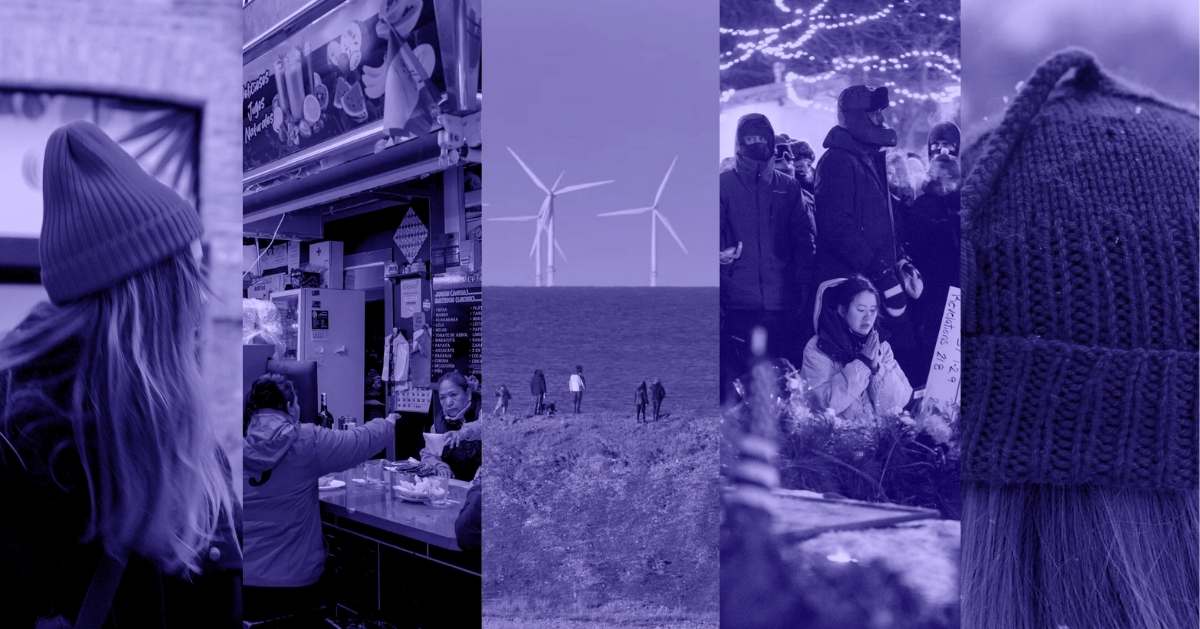Every day the Good Good Good team collects the best good news in the world and shares it with our community. Here are the highlights for this week!
If you want to get good news in your inbox every day, join the Goodnewsletter — the free daily newsletter designed to leave you feeling hopeful.
The Best Positive News We’re Celebrating This Week —
Debunking stereotypes, a new study found that people experiencing homelessness spend cash on food, shelter, and clothing
In a previous U.S. survey that tracked “public mistrust” in the ability of unhoused people to manage their money, respondents said that recipients of $7,500 no-strings-attached cash would spend most of it on “temptation goods” like drugs and alcohol.
That prediction — and the harmful biases that they’re based on — has just been proven incorrect by a study in Canada. Canadian researchers gave 50 people experiencing homelessness a one-time, lump sum of $7,500 (“to enable maximum purchasing freedom and choice”), and the recipients spent it mostly on rent, food, housing, transit, and clothing.
They also spent an average of 99 fewer days homeless than a control group, increased their savings, and spent less time in shelters — “costing” society less by doing so.
Why is this good news? Often, our biases and stereotypes about unhoused folks get in the way of developing policies that actually help reduce homelessness and support people experiencing it. In reality, unhoused people spend money, much like anyone would — to meet their basic needs.
Studies like this are important to help us change our biases and find better, evidence-based solutions.
The U.S. is on track to close half of its coal-fired power generation capacity by 2026
Just 15 years after its coal generation capacity peaked in 2011, the U.S. is now on track to close 50% of that capacity by 2026, according to reported coal plant closures. It will take the country’s coal generation capacity to 159 gigawatts (GW), down from 318GW in 2011 — and it is set to fall even more, to 116GW by 2030.
The plant closures are a result of lower demand for coal-generated power, higher costs of plant operation and maintenance, and the continually lowering costs of and investment in renewable energy sources like solar and wind.
While generation capacity is indeed falling, actual energy generation by the existing coal plants is falling even faster. In both 2020 and 2022, the U.S. produced less than half of coal’s 2011 power level.
As the country’s shift to a renewable energy future continues to come into clearer view, it’s important that that the transition is just — that workers are taken care of, plants are safely closed, and more.
New results from an 18-year study in Costa Rica show that small farms with “natural landscape” features help protect tropical birds
For nearly two decades, ornithologist James Zook has been studying and collecting records for around 430 tropical bird species in Costa Rica. He’s looked at their populations in undisturbed forests and on small farms.
While his findings show that the birds thrive best in undisturbed forests — they also do comparatively well on “diversivied farms” that mimic a natural forest environment in their landscapes. These farms include features like shade trees, hedgerows, and tracts of forest.
And with 18 years of data to back up his theory, Zook says it shows that the birds aren’t just passing through — but persisting and thriving in these types of farming environments, too.
Why is this good news? Plants, birds, and other animals that are native to an area are critical for its survival — and by extension, the survival of humans. Data like this further proves that we need to not only implement conservation efforts in untouched, protected parts of the planet — but in the land we use for agriculture, housing, and other forms of development, too.
The Biden administration just canceled all remaining oil and gas drilling leases in Alaska’s Arctic National Wildlife Refuge
In a significant move for both climate action and protecting biodiversity, the U.S. Interior Department just announced it is officially canceling all remaining oil and gas leases in the Arctic National Wildlife Refuge in Alaska.
The cancellation of the seven remaining leases in the refuge will protect 1.5 million acres of coastal plain — both a critical ecosystem for wildlife and an area seen as sacred to the Indigenous Gwich’in since it's where caribou they rely on migrate to give birth.
The leases were part of a sale held in the remaining days of the Trump administration, but shortly after taking office, President Biden placed a moratorium on the leasing program so that the Interior Department could review it. It found there were “multiple legal deficiencies” with the leases.
Why is this good news? The overwhelming consensus in the scientific community is that we need to urgently and rapidly phase out the use of fossil fuels in our energy systems in order to avoid the most catastrophic impacts of the climate crisis.
This decision will ensure that these lands aren’t opened to new oil and gas drilling — protecting the future health of people, animals, and the planet, in this immediate region and beyond.
A crew of mostly women are building a state-of-the-art maternal health hospital in Sierra Leone — challenging gender norms in the process
In Koidu, the capital of Kono District in Eastern Sierra Leone, a construction crew is busy building a new legacy for the region: a state-of-the-art maternal health hospital called the Maternal Center of Excellence.
Around 60% of the team that’s building it are women, and are not only benefiting from the safe, fair work environment and growth of their skills — they will likely also personally benefit from the health care services offered at the hospital once it’s open.
The construction crew grew to be mostly women after news that they were treated well and fairly spread through word of mouth in Kono. One worker said they hope that the construction project gives other women the courage to come work there, too.
Why is this good news? Women around the world often lack equitable access to jobs that help them earn money to support their families, which can lead to more, compounding issues. The women building this hospital are changing minds about what they’re capable of — and a writing a new, better story for Sierra Leone’s high maternal and infant mortality rates in the process.
A family in Mexico gave up fishing to monitor, protect, and rescue sea turtles
Before a Mexican law prohibited the practice in 1990, fishers saw turtles they occasionally caught by accident as a source of extra income that could help in the event of an economic emergency.
That was true for Cosme Becerra, but in 2010, he decided to chart a different course and formally dedicated his time to the conservation of turtles in Kino Bay, a small fishing community with just over 6,400 residents located in the state of Sonora in northwestern Mexico.
He began working as a boat captain for marine mammal-monitoring and through this work, Becerra convinced his family that the future was in wildlife conservation.
Now, the whole Becerra family practices sustainable fishing. They even invested their savings and income to buy a boat to monitor turtles and rescue them from abandoned fishing gear.
More good news of the week —
The latest release of “Call of Duty” will feature real-time, AI-powered hate speech moderation. The ToxMod technology will supplement the game’s existing anti-toxicity measures, which have already proven to help reduce behavior that violates the game’s code of conduct.
The Fort Worth Zoo just announced the “groundbreaking” births of critically endangered gharial crocodiles. In a “historic conservation success,” four hatchlings were born at the zoo, which is the only one in the U.S. to have produced offspring.
A new blood test could help diagnose Parkinson’s disease before symptoms appear. Earlier diagnosis of the disease could help with treatments, since it would have been caught before significant neurological damage has already been done.
Following Hurricane Hilary, most of California is now officially drought-free. Experts in the state say there’s still lots of room for progress in capturing rainwater, as much of the water that Hilary brought ran off into the ocean.
Thanks to the country’s “war on pollution,” people in China are now living two years longer. A new report found that China’s pollution levels in 2021 had fallen 42% from 2013, and praised China’s “staggering success in combating pollution.”
Major British retailers just lowered the cost of period underwear, and are calling on the government to eliminate the tax, too. Brands John Lewis and Waitrose joined supermarkets Tesco and Marks & Spencer in the “Say Pants to the Tax” campaign to make the popular period product more affordable.
A Texas school created book clubs that have helped to massively improve reading scores in school. In the clubs, students can talk about what they’re reading with friends, aiding with reading comprehension and enjoyment, and test scores have brought the school from an F to a B campus.
A conservation organization just purchased the world’s largest herd of privately-owned white rhinos to rewild them. Africa Parks aquired the herd of 2,000 rhinos after the farm they’re living on was put up for auction — and received no bids.
California just became the largest economy in the world to support a Fossil Fuel Non-Proliferation Treaty. The treaty explicitly stop the expansion of fossil fuels and manage a just, equitable transition away from coal, oil and gas to clean energy.
Fossil fuel burning in the European Union fell to the lowest level on record in the first half of 2023. Driven by lower demand and new clean energy sources, the 27 member states burned 17% less fossil fuel to make electricity than the same period the year before.
Making history, Ava DuVernay is the first Black woman to have film compete in the Venice Film Festival. DuVernay’s new film “Origin” will be the first by a Black woman to compete for the Golden Lion in the festival’s 80-year history.
A Texas judge temporarily blocked a law that could have put drag performers in the state in jail. A group of performers and advocates said the new law threatened their livelihoods and would censor their freedom of expression — and the judge agreed.



